1
2
3
4
5
6
7
8
9
10
11
12
13
14
15
16
17
18
19
20
21
22
23
24
25
26
27
28
29
30
31
32
33
34
35
36
37
38
39
40
41
42
43
44
45
46
47
48
49
50
51
52
53
54
55
56
57
58
59
60
61
62
63
64
65
66
67
68
69
70
71
72
73
74
75
76
77
78
79
80
81
82
83
84
85
86
87
88
89
90
91
92
93
94
95
96
97
98
99
100
101
102
103
104
105
106
107
108
109
110
111
112
113
114
115
116
117
118
119
120
121
122
123
124
125
126
127
128
129
130
131
132
133
134
135
136
137
138
139
140
141
142
143
144
145
146
147
148
149
150
151
152
153
154
155
156
157
158
159
160
161
162
163
164
165
166
167
168
169
170
171
172
|
from capstone import *
from capstone.x86 import *
from capstone.x86_const import *
buf = open('runofthemill', 'rb').read()
code = buf[0x1054:0x117F7]
cs = Cs(CS_ARCH_X86, CS_MODE_64)
cs.imm_unsigned = True
cs.detail = True
def all_insns():
it = cs.disasm(code, 0x401054)
return it
def is_buffer_addr(addr):
return 0x412000 <= addr < 0x412040
def buffer_off(op):
return op.mem.disp - 0x412000
def is_buffer_op(op0):
return (op0.type == X86_OP_MEM \
and is_buffer_addr(op0.mem.disp) \
and op0.mem.scale == 1 \
and op0.mem.base == X86_REG_INVALID \
and op0.mem.index == X86_REG_INVALID \
)
def is_temp_op(op0):
return (op0.type == X86_OP_MEM \
and op0.mem.disp == 0x412090 \
and op0.mem.scale == 1 \
and op0.mem.base == X86_REG_INVALID \
and op0.mem.index == X86_REG_INVALID \
)
SIMPLE_ENC = {
X86_INS_ADD: X86_INS_SUB,
X86_INS_SUB: X86_INS_ADD,
X86_INS_XOR: X86_INS_XOR,
X86_INS_ROR: X86_INS_ROL,
X86_INS_ROL: X86_INS_ROR,
}
class Operator:
def __init__(self, op, off, size, param):
self.op = op
self.off = off
self.size = size
self.param = param
@classmethod
def is_simple(cls, insn:CsInsn):
if insn.id not in SIMPLE_ENC:
return False
if len(insn.operands) != 2:
return False
op0 = insn.operands[0]
op1 = insn.operands[1]
if not is_buffer_op(op0):
return False
if not (op1.type == X86_OP_IMM):
return False
return True
@classmethod
def simple_op(cls, insn:CsInsn):
op0 = insn.operands[0]
op1 = insn.operands[1]
return cls(insn.id, buffer_off(op0), op0.size, op1.imm)
ins_types = {}
for insn in all_insns():
key = insn.mnemonic
if key not in ins_types:
ins_types[key] = 1
else:
ins_types[key] += 1
ops = []
regs = {}
for insn in all_insns():
if Operator.is_simple(insn):
op = Operator.simple_op(insn)
assert op is not None, hex(insn.address) +' ' + insn.mnemonic + ' ' + insn.op_str
ops.append(op)
elif insn.id in (X86_INS_MOVABS, X86_INS_MOV, X86_INS_MOVQ):
op0 = insn.operands[0]
op1 = insn.operands[1]
opty = (op0.type, op1.type)
assert opty in {(X86_OP_REG, X86_OP_IMM), (X86_OP_REG, X86_OP_MEM), (X86_OP_MEM, X86_OP_REG)}
if opty == (X86_OP_REG, X86_OP_IMM):
regs[op0.reg] = op1
elif opty == (X86_OP_REG, X86_OP_MEM):
assert is_buffer_op(op1) or is_temp_op(op1)
regs[op0.reg] = op1
elif opty == (X86_OP_MEM, X86_OP_REG):
assert is_buffer_op(op0) or is_temp_op(op0)
if is_temp_op(op0):
regs[X86_REG_ENDING] = regs[op1.reg]
else:
assert op1.reg == X86_REG_MM0
o = regs[op1.reg]
assert isinstance(o, Operator)
assert buffer_off(op0) == o.off
ops.append(o)
else:
raise AssertionError
elif insn.id == X86_INS_PXOR:
op0 = insn.operands[0]
op1 = insn.operands[1]
assert op0.type == X86_OP_REG and op1.type == X86_OP_MEM
assert op0.reg == X86_REG_MM0 and is_buffer_op(op1)
op00 = regs[op0.reg]
assert op00.type == X86_OP_IMM or is_temp_op(op00)
if is_temp_op(op00):
op00 = regs[X86_REG_ENDING]
assert op00.type == X86_OP_IMM
regs[op0.reg] = Operator(X86_INS_XOR, buffer_off(op1), op1.size, op00.imm)
elif insn.id in SIMPLE_ENC:
pass
else:
raise AssertionError(hex(insn.address) +' ' + insn.mnemonic + ' ' + insn.op_str)
for i in reversed(ops):
mnem = cs.insn_name(SIMPLE_ENC[i.op])
sz = {8:'qword', 4:'dword', 2:'word', 1:'byte'}[i.size]
param = i.param
if param < 0:
param += 1 << (i.size * 8)
if i.size != 8:
print(f'{mnem} {sz} [buffer + 0x{i.off:x}], 0x{param:x}')
else:
print(f'mov rax, 0x{param:x}')
print(f'{mnem} {sz} [buffer + 0x{i.off:x}], rax')
|

